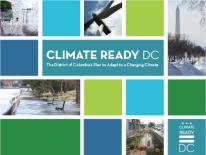
The District is already experiencing the impacts of climate change. Climate change refers to long-term changes in global temperature, precipitation, wind patterns, and other aspects of climate. These global changes have serious consequences for the District. In the past few years, the District has seen record-breaking extreme weather (like heat waves and snowstorms), higher tides caused by rising sea level, heavy rains and flooding, and warmer average temperatures and two to three times as many dangerously hot days.
Climate Ready DC 2.0
DOEE and the Homeland Security and Emergency Management Agency are currently developing Climate Ready DC 2.0, an update to the original plan released in 2016. Climate Ready DC 2.0 will also serve as an update to the Climate Action goal of Resilient DC, originally published in 2019.
As part of this initiative, HSEMA and DOEE published a series of interactive web pages that describe the extreme weather the District of Columbia is facing and how the District is preparing for these changes:
- Climate Ready DC: What does it mean to be Climate Ready?
- Climate Ready DC: Lived Experiences with Climate Change
- An Introduction to Climate Ready D.C. 2.0
Climate Ready DC
Climate Ready DC is the District’s plan to adapt to a changing climate. While the District is doing its part to reduce greenhouse gas emissions, we are already seeing the impacts of climate change. Climate adaptation means taking action today to prepare people, homes, communities, businesses and infrastructure for the potential impacts of climate change.
- 2024 - Climate Projections & Scenario Development Update
- 2022 - World Health Organization (WHO) Health & Climate Change Urban Profile, District of Columbia
- 2020 - Climate Ready by 2050
- 2016 - Climate Ready DC Plan
- 2016 - Climate Projections & Scenario Development
- 2016 - Vulnerability and Risk Assessment
- 2016 - Climate Change Adaptation Recommendations
Keep Cool DC
Keep Cool DC is the District’s extreme heat adaptation strategy. Extreme heat is a dangerous hazard that can pose serious health risks to people and is the leading cause of climate-related deaths nationwide. Summer temperatures are projected to continue increasing in years to come, so it is critical for the District to “keep cool” by reducing the drivers that increase temperatures and expanding strategies that protect residents from heat.
- Keep Cool DC
- District of Columbia Heat Sensitivity-Exposure Index (HSEI)
- HSEI Methodology Report
- DOEE 2013 Study: Assessing the Health Impacts of Urban Heat Island Reduction Strategies in the District
Community Resilience Hubs
Climate Ready DC and Resilient DC call for the District Government to create Community Resilience Hubs. Community Resilience Hubs are community owned and operated facilities that provide information and services to build resilient communities before, during, and after emergency events. DOEE supports the District's first resilience hub in Ward 7 and hosts a Community of Practice for community organizations interested in operating as Community Resilience Hubs.
Ivy City Climate Resilience Strategy
DOEE is working with the Ivy City community to create a Climate Resilience Strategy to reduce the risk of flooding and extreme heat. The Strategy will include the design of a network of projects to reduce flooding and extreme heat while also providing additional benefits for the community, such as improved park space, more shade and greenery, safer streets, and better air quality. Read More>>
Resilient Design Guidelines
In 2021 the District released Resilient Design Guidelines. This document provides a methodology for assessing the vulnerabilities of existing or proposed buildings and numerous best practices to reduce risks.
Affordable Housing Resilience and Solar Assessment Tool
In 2019 DOEE created a tool to assess climate hazards to the District’s affordable housing stock and to gauge the potential for solar and battery storage. Enterprise Community Partners, New Ecology and the National Housing Trust developed an analysis tool and tested it on 20 affordable housing properties across the District. The tool is now available for public use:
- Resilience and Solar Assessment Tool
- Resilience and Solar Assessment Tool User Manual
- DOEE Assessment Tool Public Outreach
- Resilience Assessment Initial Questionnaire
- Incorporating Resiliency into DC Affordable Housing: A Strategy Map
(These documents are also attached below)
Other Climate Adaptation Efforts
- The DC Flood Task Force launched in September 2021 with 13 Task Force members and 15 consulting members, who will identify and prioritize policies and projects to bolster flood readiness throughout the District.
- The District appointed a Chief Resilience Officer (CRO) to coordinate resiliency efforts and developed the Resilient DC plan. Placed within the Homeland Security and Emergency Management Agency (HSEMA), the CRO and other HSEMA staff incorporate climate change into the District’s risk assessments and emergency response plans.
- The District developed the Flood Risk Tool to help design professionals, developers, and consultants identify the potential flood impacts of a particular site.
- The District has drafted proposed updates to floodplain regulations that would implement a tidal shoreline buffer to reduce waterfront flood risks and address future sea level rise. The proposed updated regulations are also projected to expand the regulated floodplain to account for changes in precipitation patterns and create more stringent safety standards for the development of new critical facilities including hospitals, emergency services, shelter facilities and critical infrastructure systems within the 500-year floodplain.
- The District is creating a first-of-its-kind FloodSmart Homes program which will help install flood mitigation upgrades at homes that are in the floodplain, the majority of which are in overburdened communities.
- The District is exploring new opportunities to store floodwater while creating community amenities such as parks. To learn more, see our Blue Green Infrastructure Report.

